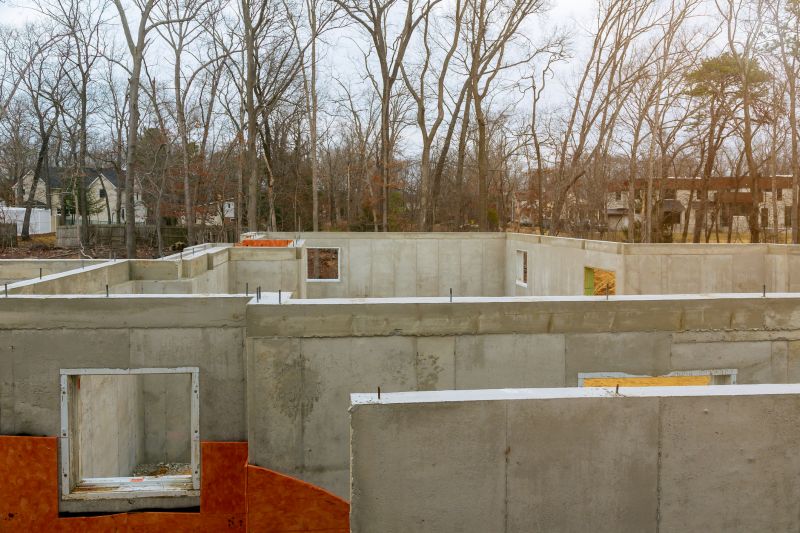Ultimate Product Selection For Professional Concrete Installations
Access a curated list of essential tools and materials to elevate your concrete projects with precision and ease.
 Concrete installations are fundamental in construction projects, whether for residential driveways, commercial flooring, or decorative patios. Selecting the right products ensures durability, safety, and aesthetic appeal. From foundational materials to finishing tools, the array of products available caters to various project requirements and skill levels. Proper preparation and the right selection of supplies can significantly influence the longevity and appearance of concrete structures.
Concrete installations are fundamental in construction projects, whether for residential driveways, commercial flooring, or decorative patios. Selecting the right products ensures durability, safety, and aesthetic appeal. From foundational materials to finishing tools, the array of products available caters to various project requirements and skill levels. Proper preparation and the right selection of supplies can significantly influence the longevity and appearance of concrete structures.
Top Overall Option
Concrete Bonding and Sealing Compound
A versatile concrete bonding and sealing compound can serve multiple functions, including enhancing adhesion between layers and protecting surfaces from moisture and wear. This type of product is often used in repair work, overlays, and new installations, helping to improve the longevity of concrete projects. Its ease of application and compatibility with various concrete types make it a practical choice for both DIY enthusiasts and professionals.
Types of Products For Concrete Installations
Concrete Mixes
Pre-mixed or custom-blended concrete used for pouring foundations, slabs, and other structural elements.
Bonding Agents
Products designed to improve adhesion between existing concrete and new layers or overlays.
Curing Compounds
Sprays or liquids that help retain moisture during the curing process to prevent cracking and ensure proper hardening.
Sealants and Waterproof Coatings
Protective layers applied to concrete surfaces to prevent moisture ingress and surface deterioration.
Surface Finishing Tools
Tools such as trowels, floats, and edgers used to achieve smooth and professional surface finishes.
Vibrators and Compactors
Equipment used to remove air pockets and ensure proper compaction of concrete during placement.
Form Release Agents
Products that facilitate easy removal of formwork and prevent concrete from sticking to molds.
Admixtures
Chemical additives that modify the properties of concrete, such as setting time or workability.
Concrete Edgers
Tools for shaping and rounding edges of poured concrete for aesthetic and functional purposes.
Expansion Joints
Materials used to control cracking caused by temperature fluctuations and structural movement.
Grout and Mortar Mixes
Specialized mixes used for filling gaps, setting fixtures, or bonding decorative elements.
Reinforcement Mesh and Rebar
Materials used to strengthen concrete structures and improve load-bearing capacity.
Concrete Dyes and Stains
Coloring products used to enhance the visual appeal of concrete surfaces.
Surface Cleaners
Solutions designed to remove dirt, oil, and other contaminants before finishing or sealing.
Grinding and Polishing Tools
Equipment used to refine concrete surfaces for a smooth, polished appearance.
Anchor Bolts and Fasteners
Hardware used to attach fixtures securely to concrete surfaces.
Concrete Repair Patches
Products formulated for fixing cracks, holes, or surface damage in existing concrete.
Popular Choices
Commonly used to protect concrete surfaces from moisture and staining, enhancing durability.
Widely selected for various small to medium-sized projects, offering convenience and consistency.
Popular for ensuring proper compaction during large-scale pours and foundation work.
Essential for finishing concrete surfaces to achieve smoothness and uniformity.
Frequently chosen for protecting below-grade concrete structures from water intrusion.
Commonly used to accommodate movement and prevent cracking in concrete slabs.
Popular for creating clean, rounded edges on poured concrete surfaces.
Often selected to improve concrete's workability and structural properties.
Widely used to facilitate clean form removal and surface quality.
A frequently used material for filling gaps and anchoring fixtures.
Popular for adding strength to slabs, driveways, and walkways.
Chosen for decorative purposes to add color and visual interest.
Commonly used for quick fixes to surface cracks and minor damages.
Often used to smooth and level surfaces for a polished finish.
Frequently selected for securing fixtures and structural elements.
Popular for preparing surfaces before sealing or finishing.
Widely used to repair or overlay existing concrete surfaces.
Commonly chosen for creating molds and supporting poured concrete.
Understanding the different types of products used in concrete installation is essential. These include bonding agents that enhance adhesion, curing compounds that promote proper setting, and sealants that protect against moisture and wear. Additionally, tools such as trowels, floats, and edgers are vital for achieving smooth finishes. For larger projects, equipment like concrete mixers and vibration tools help improve efficiency and consistency.
In Frederick, MD, where construction and renovation are ongoing, having access to quality concrete installation products can make a notable difference. Whether working on a small residential project or a large commercial site, selecting appropriate products tailored to specific needs can streamline the process and improve results. It is important to consider factors such as compatibility with existing materials, environmental conditions, and project scope when choosing supplies. Proper use and application of these products can help ensure that concrete structures maintain their integrity and visual appeal over time.
Key Buying Considerations
- Project scope and size to determine the quantity and type of products needed.
- Compatibility of products with existing concrete or other building materials.
- Environmental conditions such as temperature, humidity, and exposure to elements.
- Ease of application and whether specialized tools or skills are required.
- Durability and longevity expectations for the finished concrete surface.
- Surface finish preferences, including smoothness, texture, and color options.
- Budget constraints and cost-effectiveness of different product options.
- Reputation and reliability of the product manufacturer or supplier.
- Safety considerations, including proper handling and usage instructions.
- Compatibility with reinforcement materials like rebar or mesh.
- Timeframe for curing and setting times to meet project deadlines.
- Environmental impact and VOC content, if applicable, for indoor projects.
- Availability of technical support or customer service from the supplier.
- Regulatory compliance and adherence to local building codes.
- Long-term maintenance requirements and ease of repairs.
